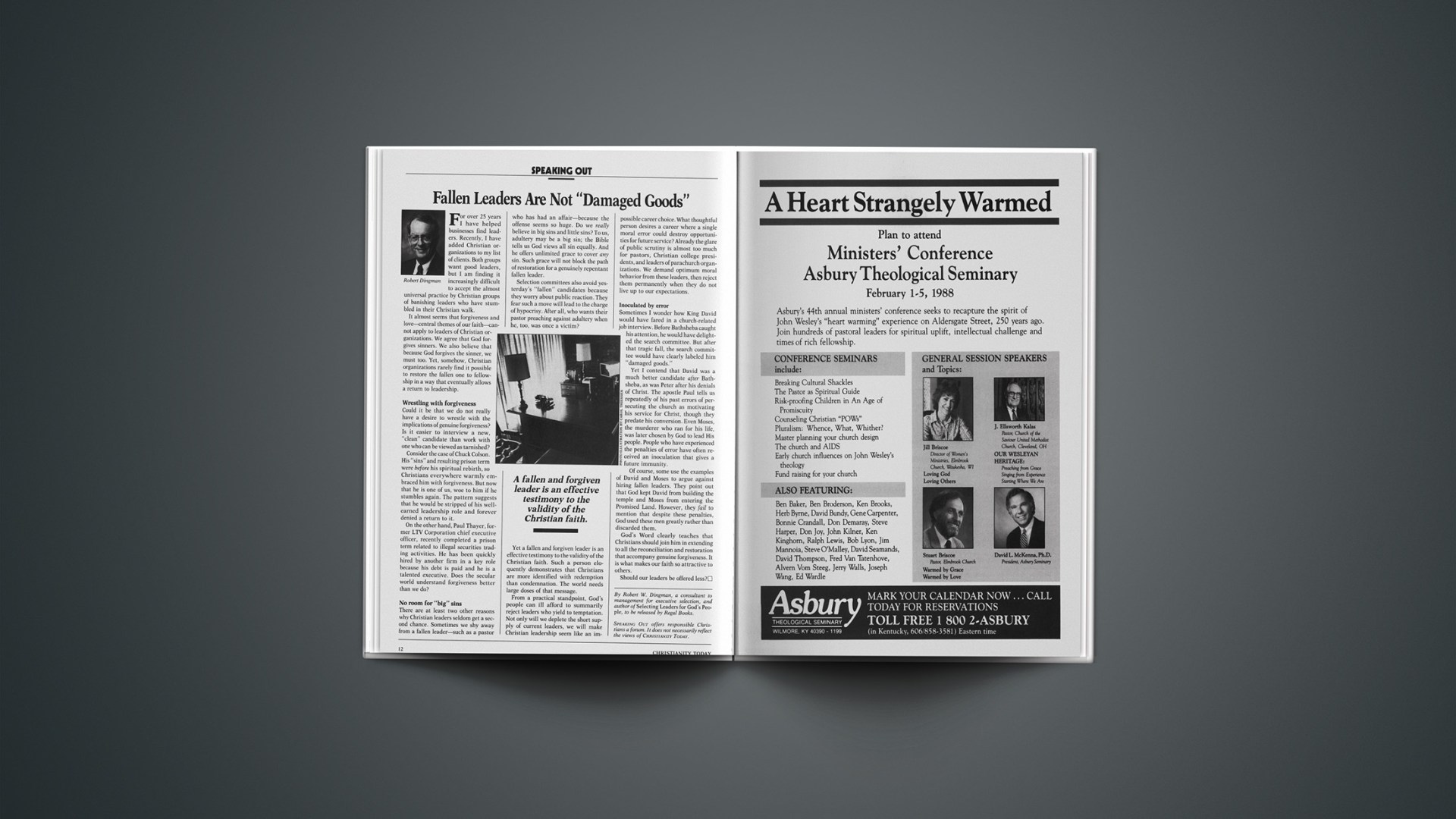For over 25 years I have helped businesses find leaders. Recently, I have added Christian organizations to my list of clients. Both groups want good leaders, but I am finding it increasingly difficult to accept the almost universal practice by Christian groups of banishing leaders who have stumbled in their Christian walk.
It almost seems that forgiveness and love—central themes of our faith—cannot apply to leaders of Christian organizations. We agree that God forgives sinners. We also believe that because God forgives the sinner, we must too. Yet, somehow, Christian organizations rarely find it possible to restore the fallen one to fellowship in a way that eventually allows a return to leadership.
Wrestling With Forgiveness
Could it be that we do not really have a desire to wrestle with the implications of genuine forgiveness? Is it easier to interview a new, “clean” candidate than work with one who can be viewed as tarnished?
Consider the case of Chuck Colson. His “sins” and resulting prison term were before his spiritual rebirth, so Christians everywhere warmly embraced him with forgiveness. But now that he is one of us, woe to him if he stumbles again. The pattern suggests that he would be stripped of his well-earned leadership role and forever denied a return to it.
On the other hand, Paul Thayer, former LTV Corporation chief executive officer, recently completed a prison term related to illegal securities trading activities. He has been quickly hired by another firm in a key role because his debt is paid and he is a talented executive. Does the secular world understand forgiveness better than we do?
No Room For “Big” Sins
There are at least two other reasons why Christian leaders seldom get a second chance. Sometimes we shy away from a fallen leader—such as a pastor who has had an affair—because the offense seems so huge. Do we really believe in big sins and little sins? To us, adultery may be a big sin; the Bible tells us God views all sin equally. And he offers unlimited grace to cover any sin. Such grace will not block the path of restoration for a genuinely repentant fallen leader.
Selection committees also avoid yesterday’s “fallen” candidates because they worry about public reaction. They fear such a move will lead to the charge of hypocrisy. After all, who wants their pastor preaching against adultery when he, too, was once a victim?
Yet a fallen and forgiven leader is an effective testimony to the validity of the Christian faith. Such a person eloquently demonstrates that Christians are more identified with redemption than condemnation. The world needs large doses of that message.
From a practical standpoint, God’s people can ill afford to summarily reject leaders who yield to temptation. Not only will we deplete the short supply of current leaders, we will make Christian leadership seem like an impossible career choice. What thoughtful person desires a career where a single moral error could destroy opportunities for future service? Already the glare of public scrutiny is almost too much for pastors, Christian college presidents, and leaders of parachurch organizations. We demand optimum moral behavior from these leaders, then reject them permanently when they do not live up to our expectations.
Inoculated By Error
Sometimes I wonder how King David would have fared in a church-related job interview. Before Bathsheba caught his attention, he would have delighted the search committee. But after that tragic fall, the search committee would have clearly labeled him “damaged goods.”
Yet I contend that David was a much better candidate after Bathsheba, as was Peter after his denials of Christ. The apostle Paul tells us repeatedly of his past errors of persecuting the church as motivating his service for Christ, though they predate his conversion. Even Moses, the murderer who ran for his life, was later chosen by God to lead His people. People who have experienced the penalties of error have often received an inoculation that gives a future immunity.
Of course, some use the examples of David and Moses to argue against hiring fallen leaders. They point out that God kept David from building the temple and Moses from entering the Promised Land. However, they fail to mention that despite these penalties, God used these men greatly rather than discarded them.
God’s Word clearly teaches that Christians should join him in extending to all the reconciliation and restoration that accompany genuine forgiveness. It is what makes our faith so attractive to others.
Should our leaders be offered less?
By Robert W. Dingman, a consultant to management for executive selection, and author of Selecting Leaders for God’s People, to be released by Regal Books.
SPEAKING OUT offers responsible Christians a forum. It does not necessarily reflect the views of CHRISTIANITY TODAY.









